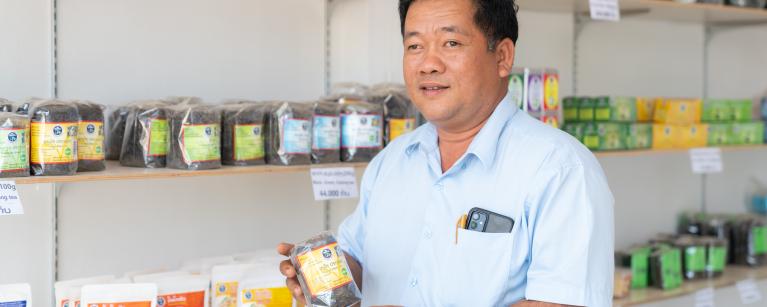SOLAR Project: Chansamone Phetbouasone Supporting the Lao Government’s efforts to promote sustainable development and gender equality in rural communities

Chansamone Phetbouasone Supporting the Lao Government’s efforts to promote sustainable development and gender equality in rural communities
Blessed with lush landscapes and Stories from the SOLAR Project 83 rich natural resources, the Lao People’s Democratic Republic is a country brimming with potential. However, despite the abundance of resources, many people in rural areas lack the knowledge and tools needed to harness these assets for their own benefit. Now, in a bid to combat poverty and pave the way for sustainable development, efforts are being made to equip rural communities with the skills they need to thrive. One key initiative driving this change is the Association to Support the Development of Peasant Societies (ASDSP), established in 2008.
According to Chansamone Phetbouasone, a Technical Officer at ASDSP, the association is dedicated to supporting Lao farmers in integrating sustainable practices into their work. By emphasizing the importance of environmental conservation, social responsibility and traditional values, the ASDSP aims to uplift rural communities and pave the way for a brighter future. To this end, the ASDSP provides technical support to villagers on organic agriculture, value chains and access to markets in Vientiane, and export through fair trade certification. Their products are labelled under the Lao Farmer Products enterprise. With the support of the SOLAR Project, a European Union-funded initiative implemented by the ILO and Oxfam, the ASDSP has expanded the scope of its activities to offer training sessions on negotiation skills, social security schemes, gender equality, and health and safety. In addition, with SOLAR Project support the ASDSP has started working closely with l ocal government partners to form farming production groups in Paksong and Thateng districts and to empower women leadership in these groups (by encouraging nomination of women in administrative and financial roles). By equipping farmers with the necessary knowledge and tools, the ASDSP aims to enhance productivity, improve livelihoods, enhance gender equality and foster a sense of security among rural communities.
But despite these efforts, challenges persist. Weather extremes and crop diseases continue to pose threats to farmers’ livelihoods, while fluctuating market prices add further complexity to the agricultural sector. The rising costs of labour and agricultural inputs further compound these challenges, making it difficult for farmers to sustain their operations. Moreover, concerns around a lack of social security coverage and access to quality healthcare persist among rural communities; though there is a growing interest in social protection schemes. Chansamone said positive changes are also taking place with regard to gender equality, but admitted that given the patriarchal nature of traditional Lao society, this concept can be difficult to get across and it will take time to convince communities around the country of the need for changes in their behaviours, family structures and distribution of labour. But after talks held between villagers and the ASDSP and other initiatives that are trying to drive change and alter ingrained perceptions, people are beginning to change their attitudes, and slowly but surely, women are f inding their voice.
Today, women can be seen taking a more active role in decision-making and in leading the direction of discussions at meetings, so that they have a greater say in community affairs. In addition, there are hopeful signs of greater equality among families, with men taking on more responsibility in household activities and showing more support for their wives and other womenfolk.
As the Lao People’s Democratic Republic navigates the numerous challenges it faces and strives for sustainable development, it is clear that empowering rural communities is essential, so that everyone can fulfil their potential by discovering ways to be more productive. By equipping villagers with the skills, knowledge and resources needed to thrive, initiatives like the ASDSP are not only transforming lives but also paving the way for a more resilient and prosperous future for all.